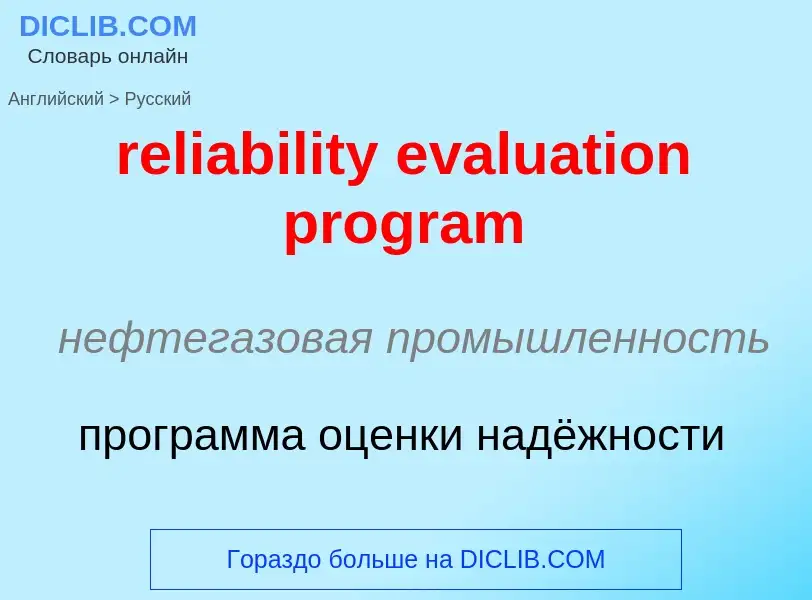Перевод и анализ слов искусственным интеллектом ChatGPT
На этой странице Вы можете получить подробный анализ слова или словосочетания, произведенный с помощью лучшей на сегодняшний день технологии искусственного интеллекта:
- как употребляется слово
- частота употребления
- используется оно чаще в устной или письменной речи
- варианты перевода слова
- примеры употребления (несколько фраз с переводом)
- этимология
reliability evaluation program - перевод на русский
нефтегазовая промышленность
программа оценки надёжности
Википедия
Program evaluation is a systematic method for collecting, analyzing, and using information to answer questions about projects, policies and programs, particularly about their effectiveness and efficiency. People who regularly uses program evaluation skills and techniques on the job are generally known by the title Program Analyst, while people who's positions combine administrative assistant or secretary duties with program evaluation are generally known by the title Program Assistant, Program Clerk, or Program Associate, positions that in addition add lower-level project management duties go by the title Program Coordinator. In both the public sector and private sector, as well as the voluntary sector, stakeholders often want to know whether the programs they are funding, implementing, voting for, receiving or objecting to are producing the intended effect. While program evaluation first focuses around this definition, important considerations often include how much the program costs per participant, how the program could be improved, whether the program is worthwhile, whether there are better alternatives, if there are unintended outcomes, and whether the program goals are appropriate and useful. Evaluators help to answer these questions, but the best way to answer the questions is for the evaluation to be a joint project between evaluators and stakeholders.
The process of evaluation is considered to be a relatively recent phenomenon. However, planned social evaluation has been documented as dating as far back as 2200 BC. Evaluation became particularly relevant in the U.S. in the 1960s during the period of the Great Society social programs associated with the Kennedy and Johnson administrations. Extraordinary sums were invested in social programs, but the impacts of these investments were largely unknown.
Program evaluations can involve both quantitative and qualitative methods of social research. People who do program evaluation come from many different backgrounds, such as sociology, psychology, economics, social work, as well as political science subfields such as public policy and public administration who have studied a similar methodology known as policy analysis. Some universities also have specific training programs, especially at the postgraduate level in program evaluation, for those who studied an undergraduate subject area lacking in program evaluation skills.
Program Evaluation The problem of limited resources remains unresolved and serious implications for the future of many government programs. Within the context of knowing how the government could maximize its limited resources in attaining its planned goals, it developed a technique known as evaluation.
The problem of limited resources remains unresolved and serious implications for the future of many government programs. Within the context of knowing how the government could maximize its limited resources in attaining its planned goals, it developed a technique known as evaluation.
Evaluation is an integral part of the administrative process. In the administrative process, important matters affecting the organization are considered. As two American authors point out: Decisions are made about policies and plans, programs embodying these decisions are implemented, the results achieved are evaluated, and then, based on this information, new decisions are made and the cycle is repeated.
Moreover, evaluation may be considered as "a method for determining how far an activity has progressed and how much further it should be carried to accomplish objectives". It is the comparison of actual conditions with desirable conditions. It answers the question: "To what extent are we doing what we are trying to do?"
Evaluation is also a process of systematic appraisal. As a process, it is used to determine the value, worth, or meaning of something. It may refer to a program, a method, an approach, or a situation. An evaluation of a program, for example, is called program evaluation.
A program is the totality of activities of an organization which include the plans of the organization for its immediate operation as well as its future development. A project is a part of the program.
In program evaluation, the key question is: "Did the program achieve its goals?" To succeed in its purpose, evaluation should take place at various levels of the organization. It should "be placed in the organizational structure at a level consonant with a mission."


